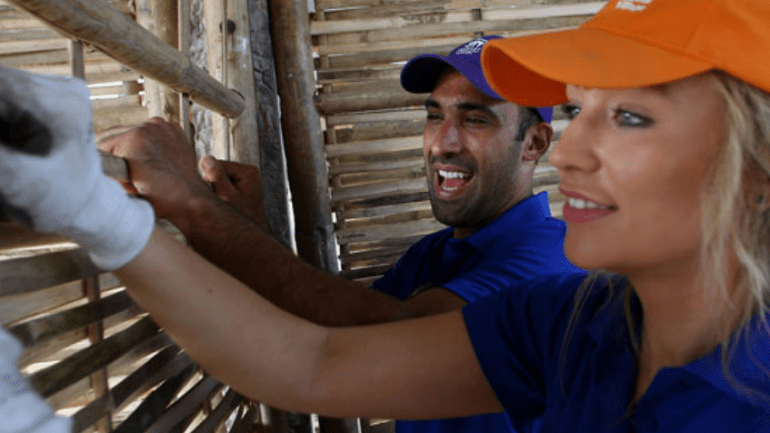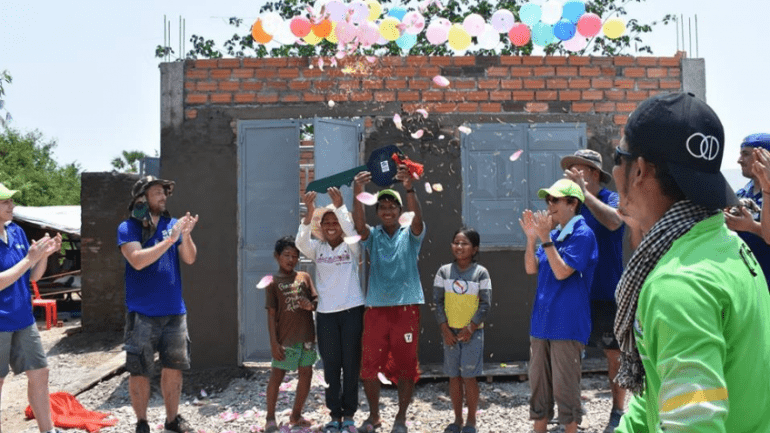Whether for business or personal benefits, corporations and their workers are going hands-on in developing countries, writes Helen Hawkes.
Being driven by ambition isn’t always the ticket to satisfaction but building a home for a family in Cambodia just might be. Some corporations say it’s also a new way of encouraging teamwork and professional development.
Anecdotal evidence suggests an increasing number of high flyers are looking for ways to step off the corporate treadmill and help save the world, and the value of the volunteering industry is estimated at about $2.6 billion worldwide a year – and growing rapidly.
There’s the traditional way to go: government-based program Australian Volunteers for International Development (AVID) has about 1400 volunteers working overseas across more than 40 countries for up to 12 months.
Or, increasingly, there’s the trendsetting, short-term project in which volunteers get to know people from a different culture and tick the helping humanity box through independent organisations such as Habitat for Humanity, Projects Abroad, United Planet, International Volunteer HQ and a host of other companies, not all of them scrupulous [see “Voluntouring Safely” below].
Volunteers may travel to everywhere from Chile, Costa Rica and Ghana to Romania, Nepal, Vietnam, Cambodia and Bangladesh working on projects that focus on childcare, environmental sustainability, health or simply increasing living standards in third world countries.
The reasons for this new trend vary but Martin Thomas, CEO of Habit for Humanity Australia believes: “Some people are just really keen to make a difference – they feel like their whole lives are about themselves. Companies are also looking to use these opportunities for professional and leadership development.”
HABITAT FOR HUMANITY
Habitat for Humanity is one of the world’s leading not-for-profit providers of housing for low income families, with volunteers having built or repaired more than 1,000,000 homes, sheltering more than 8.3 million people worldwide. Volunteers may be mixing concrete, weaving bamboo or laying bricks, a privilege they pay a minimum of $1700 for, plus the cost of flights, vaccinations, travel insurance and personal expenses.
Recently 135 senior managers from Grant Thornton Australia, one of the world’s leading assurance, tax and advisory firms, took 135 clients to Cambodia to build 10 homes.
“We were looking for a new and challenging experience in place of the ordinary partners’ conference we hold annually,” CEO Greg Keith says.
“The idea was why not invest that time in walking the talk – growing people, clients and the community.”
The results were unanticipated: both a restructuring of the business to emphasise greater teamwork and take management down to a grass roots level as well as a surge in business, which Keith believes was a result of shoring up desirable values with potential customers.
“People make decisions now about who they will do business with based on a higher purpose or culture,” he says.
VOLUNTEERS RETURN AS STRONGER GROUP
Similarly, Nicole Macdonald, Talent and Recruitment Manager at Southern Cross Austereo, says the company’s involvement in volunteer work has built teamwork.
“We have sent 20 people so far on overseas building projects and they all return more respectful of what they have,” she says.
At Projects Abroad, Australasian general manager Will Pashley says the mix of projects for experienced and younger volunteers alike – across childcare, education, human rights, conservation, construction and healthcare – is increasingly popular with corporates who get to assist those less fortunate as well as do some sightseeing.
In Madagascar, where the company is helping increase children’s literacy levels and preserve the ecosystem, volunteers may travel to one of island’s beautiful beaches, or visit Tsingy de Bemaraha – a UNESCO World Heritage Site.
In Belize, where volunteer work is centred around childcare and education, there are also Mayan ruins to be explored.
While Habitat for Humanity also offers volunteers the chance to explore the culture and surroundings, not all volunteer placements do.
David Tein, principal program director for Asia and Pacific for Microsoft Corporation, chose an intense, one-day volunteer event in Ho Chi Minh City, Vietnam, through International Volunteer HQ, to build collaboration and communications in his team.
TEAM REPORTS BEING INSPIRED
Tein and his group were part of the Feeding the Homeless project in Saigon to prepare and distribute hygienic meals to hundreds of homeless people.
“My team normally works in a virtual manner, scattered across different countries in the Asia region,” says Tein, who has previously volunteered for Tsunami Relief in Sri Lanka.
“This was the first time we have ever worked together physically in one location.”
He adds: “We had extremely positive accolades from all my team members about how inspirational the volunteering activity was.”
NSW psychotherapist Shirley Hughes believes that for those heavily involved in high pressure corporate roles, taking part in a charitable project can help reset their compass.
“Corporates are usually fuelled by personal gain in their working life and volunteering in developing countries provides an opportunity for them to give rather than receive, adding to their sense of self-satisfaction and wellbeing,” she says.
“For corporations who back volunteering, it can add to their prestige in the public view, therefore increasing business. Whether this is their prime motivation or they have a genuine desire to help may vary with different organisations.”
VOLUNTOURING SAFELY
-
- Don’t expect to be placed within a crisis zone. Volunteers usually work outside disaster areas.
- The onus should be on the company to make all arrangements such as accommodation, insurance, food, transportation and even equipment.
- A support office, or staff, should be available 24/7 in the country of choice.
- Vaccinations are usually required. Check with your GP or a travel health company.
This article originally appeared in the Australian Financial Review, 27/01/2016




